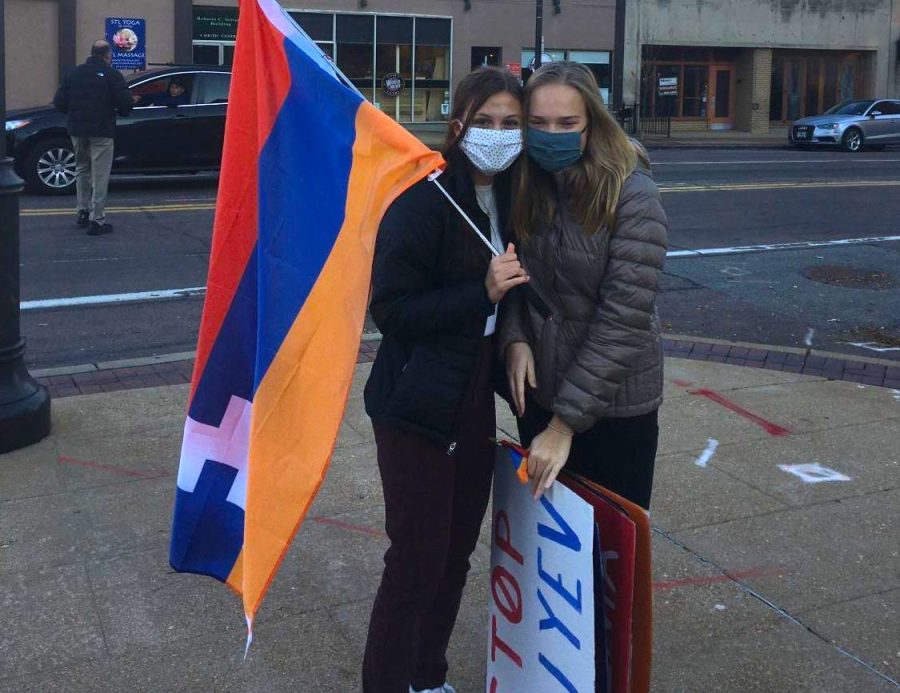ItŌĆÖs safe to say 2020 has culminated in an eventful year, with COVID-19, our Presidential Election and the Black Lives Matter movement dominating the headlines. These issues, while pertinent, have been pretty much all that we have heard about in the media and talked about in our day-to-day conversations. Our discussions have been dedicated almost exclusively to our various domestic concerns, which has caused some in the United States to be unaware of certain pressing global problems. My intent is not to demean the importance of the pressing domestic issues affecting our country, but rather to recognize some of the probes that affect the human race as a whole. Now more than ever, thinking critically about global issues can help us recognize patterns and problems and generate positive change. We need to start acting deliberately with the intent of becoming more aware in order to help those in need around the world. We cannot let these crises slip under the radar any longer. Here are five current global issues that we need to be talking about.┬Ā
Yemen Humanitarian and Political Crisis
According to UNICEF, Yemen is currently experiencing the largest humanitarian crisis, with over 80% of YemenŌĆÖs population in need of humanitarian assistance. This severe problem is a result of a combination of many issues over the span of several years.┬Ā
On top of food insecurity, attacks by Jihadists, unemployment, corruption and a separatist movement, an unstable political transition is considered the root of YemenŌĆÖs crisis. YemenŌĆÖs political transition to Abdrabbuh Mansur Hadi following the Arab Spring protests were considered a failure. Hadi struggled to deal with YemenŌĆÖs onslaught of issues, which resulted in a weak political system. Taking advantage of the unstable authority, a rebel group, the Houthis, began a separatist movement. Quickly garnering support, this group eventually took over the capital of Sanaa. As a result of fears that this rebel group had ties with Shiite powers, Saudi Arabia, among eight other mostly Sunni Arab countries, began a movement to restore Hadi to power. This conflict launched a civil war, which has lasted until today.┬Ā
The United States is also a major component of this conflict. Beginning in 2015, the United States has inserted itself into this conflict, mainly by supplying U.S. made weapons to Saudi Arabia. With this connection, the U.S. holds the power to end this conflict, yet profit is prioritized over morality.┬Ā
With both internal and external forces at play, YemenŌĆÖs current status has many civilians dying as a result of the conflict, disease, malnutrition and poor health. However, COVID-19 created what was coined by UNICEF as an ŌĆ£emergency within an emergencyŌĆØ in Yemen. A lack of clean water, sanitation, health workers and medical facilities in Yemen means the pandemic continues to have devastating effects on a country already burdened with disease, civil war and poverty.
Armenia-Azerbaijan Conflict
A sudden eruption of a decades-long conflict between Armenia and Azerbaijan occurred in September due to mounting tensions, resulting from COVID-19 and other factors. The region of Nagorno-Karabakh, known to Armenians as Artsakh, has long since been a factor within the disagreement between the two nations, with the majority of the conflict taking place in this disputed region.┬Ā
In the late Soviet period, the region of Nagorno-Karabakh declared independence, sparking the conflict between the two countries. While the region is internationally acknowledged as belonging to Azerbaijan, the majority of the population is ethnically Armenian.┬Ā
COVID-19 was one factor behind the recent spark of the conflict, due to the travel bans which prevented the traditional travel of diplomats between the country.┬Ā
On top of this, increased use of military and weapons as well as the involvement of Turkey, an enemy to Armenia and ally to Azerbaijan, have worsened the situation. Following the 1915 Armenian genocide, tensions run high between Turkey and Armenia, which means the presence of Turkey in this conflict was deeply offensive to Armenians. TurkeyŌĆÖs direct support for Azerbaijan has been said to increase fears that the conflict will become a regional problem.┬Ā
Nov. 9, Russia introduced a cease-fire between the two countries, an effort that has proved ineffective in the past. This action has left Armenians angry and dissatisfied.┬Ā
Terrorist attack in Nice, France
Worshippers in a French church were attacked and three were killed in Nice, France by a Tunisian man armed with a knife in a French church. This attack took place Oct. 29, but was just one event in a complicated history of terrorist attacks, several of which have been claimed by the Islamic State group, and Islamophobia in France.┬Ā
Following this attack, the Anti-Terrorism Prosecutor of France has launched an investigation against the young man for murder and attempted murder. FranceŌĆÖs national police chief has also ordered increased security at religious sites, including churches and mosques.
Because of the nature of this attack, the French Council of the Muslim Faith has encouraged French Muslims to refrain from celebrations that mark the birthday of Prophet Muhammad in solidarity with those affected by the terrorist attack.┬Ā
Just eight days prior to this attack, a French teacher and father, Samuel Paty, was attacked and killed after he showed a caricature of Prophet Muhammad. This frustration was sparked by the fact that the depiction of the Prophet Muhammad is considered blasphemous for Muslims.┬Ā
Just two events in history of Islamophobia and terrorism in France, French Muslims fear that these current occurrences will prompt ŌĆ£collective punishmentŌĆØ and rising racism in the country.┬Ā

Threat of an Ethiopian Civil War
Issues that have existed for decades have come to a head in recent years with the power struggle between Ethiopian Prime Minister Abiy Ahmed and the Tigray PeopleŌĆÖs Liberation Front. Recently, pressures have built between the Tigray region and Ethiopian Federal Authorities, with both governments referring to the other as ŌĆ£illegitimate and unconstitutionalŌĆØ.┬Ā
Recent occurrences, such as the COVID-19 pandemic, have resulted in fears that this internal conflict could turn into an international conflict. After the federal government postponed an election because of the virus, Tigray created their own regional parliament election, which the Ethiopian federal government has called illegal. This disagreement has prompted military involvement and both the Tigray leader and the Federal government have indicated that they are prepared for the situation to escalate into a military conflict. This situation has posed a threat of a civil war to Ethiopia.┬Ā
Uighur Muslim Crisis
Out of 11 million Uighur Muslims in China, over 1 million are reportedly being kept in more than 85 of the known internment camps in the Xinjiang region of northwestern China. This blatant abuse of the Uighur Muslims has been a fact for years in Xinjiang. After the beginning of the war on terror, China was able to use this war as justification for beginning severe movements to quell ŌĆ£separatistsŌĆØ in Xinjiang. During 2017, laws were passed in Xinjiang that seemed to target the Uighur minority, which included laws that prohibited men from growing long beards and women from wearing veils. On top of this, thousands of mosques that are sacred to the Uighur group have been demolished. The U.S. has also used this movement to further their own agenda, citing the war on terror as reasoning for establishing an economic and military presence in China.
Despite having previously denied the existence of internment camps, the government of China acknowledged the camps after photos of building construction with watchtowers and barbed wire emerged. The camps, which many experts assume were built with forced labor, are currently termed ŌĆ£re-education centersŌĆØ for Uighurs. China holds that these camps are to target poverty and extremism, which they associate with the Uighurs due to the minority having taken responsibility for terrorist attacks in China in 2013 and 2014.┬Ā
A few members of the Uighur Muslim minority have spoken about their experience in the internment camps. These individuals recall interrogations, beatings, physical and psychological torture solely because of their religious beliefs.┬Ā



![Sitting courtside before a junior varsity girlsŌĆÖ tennis match, senior Tanisi Saha rushes to finish her homework. Saha has found herself doing academic work during her athletic activities since her freshman year. ŌĆ£Being in sports has taught me how to stay organized and on top of my schoolwork. [With] a busy practice and game schedule, IŌĆÖve learned to manage my homework and study time better,ŌĆØ Saha said.](https://pwestpathfinder.com/wp-content/uploads/2025/11/DSC_0022-1200x800.jpg)
![Sophomore Maryem Hidic signs up for an academic lab through Infinite Campus, a grading and scheduling software. Some students enjoyed selecting their responsive schedule in a method that was used school-wide last year. ŌĆ£I think it's more inconvenient now, because I can't change [my classes] the day of, if I have a big test coming and I forget about it, I can't change [my class],ŌĆØ sophomore Alisha Singh said.](https://pwestpathfinder.com/wp-content/uploads/2025/10/DSC_0012-1200x801.jpg)
![Senior Dhiya Prasanna examines a bottle of Tylenol. Prasanna has observed data in science labs and in real life. ŌĆ£[I] advise the public not to just look or search for information that supports your argument, but search for information that doesn't support it,ŌĆØ Prasanna said.](https://pwestpathfinder.com/wp-content/uploads/2025/10/DSC_0073-2-1200x800.jpg)
![Junior Fiona Dye lifts weights in Strength and Conditioning. Now that the Trump administration has instituted policies such as AI deregulation, tariffs and university funding freezes, women may have to work twice as hard to get half as far. "[Trump] wants America to be more divided; he wants to inspire hatred in people,ŌĆØ feminist club member and junior Clara Lazarini said.](https://pwestpathfinder.com/wp-content/uploads/2025/05/Flag.png)
![As the Trump administration cracks down on immigration, it scapegoats many immigrants for the United StatesŌĆÖ plights, precipitating a possible genocide. Sophomore Annabella Whiteley moved from the United Kingdom when she was eight. ŌĆ£ItŌĆÖs pretty scary because IŌĆÖm on a visa. When my visa expires next year, IŌĆÖm not sure whatŌĆÖs going to happen, especially with [immigration] policies up in the air, so it is a concern for my family,ŌĆØ Whiteley said.](https://pwestpathfinder.com/wp-content/uploads/2025/05/DSC_0077-7copy.jpg)
![Shifting global trade, President Donald TrumpŌĆÖs tariffs are raising concerns about economic stability for the U.S. and other countries alike. ŌĆ£[The tariffs are] going to pose a distinct challenge to the U.S. economy and a challenge to the global economy on the whole because it's going to greatly upset who trades with who and where resources and products are going to come from,ŌĆØ social studies teacher Melvin Trotier said.](https://pwestpathfinder.com/wp-content/uploads/2025/05/MDB_3456-1200x800.jpg)



![Some of the most deadly instances of gun violence have occurred in schools, communities and other ŌĆśsafe spacesŌĆÖ for students. These uncontrolled settings give way to the need for gun regulation, including background and mental health checks. ŌĆ£Gun control comes about with more laws, but there are a lot of guns out there that people could obtain illegally. What is a solution that would get the illegal guns off the street? We have yet to find [one],ŌĆØ social studies teacher Nancy Sachtlaben said.](https://pwestpathfinder.com/wp-content/uploads/2025/01/DSC_5122-1200x800.jpg)

![Sophomore Shree Sikkal Kumar serves the ball across the court in a match against Lindbergh. Sikkal Kumar has been a varsity member of the varsity girlsŌĆÖ tennis team for two years, helping her earn the number two rank in Class 2 District 2.ŌĆ£When matches are close, itŌĆÖs easy to get nervous, but I [ground] myself by[staying] confident and ready to play,ŌĆØ Sikkal Kumar said.](https://pwestpathfinder.com/wp-content/uploads/2025/11/DSC2801-1200x798.jpg)
![Dressed up as the varsity girlsŌĆÖ tennis coach Katelyn Arenos, senior Kate Johnson and junior Mireya David hand out candy at West HighŌĆÖs annual trunk or treat event. This year, the trunk or treat was moved inside as a result of adverse weather. ŌĆ£As a senior, I care less about Halloween now. Teachers will bring their kids and families [to WestŌĆÖs Trunk or Treat], but there were fewer [this year] because they just thought it was canceled [due to the] rain. [With] Halloween, I think you care less the older you get,ŌĆØ Johnson said.](https://pwestpathfinder.com/wp-content/uploads/2025/10/DSC00892-1-1200x800.jpg)
![Focused on providing exceptional service, sophomore Darsh Mahapatra carefully cleans the door of a customerŌĆÖs car. Mahapatra has always believed his customers deserve nothing less than the best. ŌĆ£[If] theyŌĆÖre trusting us with their car and our service, then I am convinced that they deserve our 100 percent effort and beyond,ŌĆØ Mahapatra said.](https://pwestpathfinder.com/wp-content/uploads/2025/10/DSC_0018-1200x800.jpg)
![Sophomore Aleix Pi de Cabanyes Navarro (left) finishes up a soccer game while junior Ava Muench (right) warms up for cross country practice. The two came to Parkway West High School as exchange students for the 2025-2026 school year. ŌĆ£The goal for the [exchange] program is to provide opportunities for both Parkway students and our international exchange students to learn about other cultures, build connections and become confident, capable, curious and caring ŌĆö ParkwayŌĆÖs Four CŌĆÖs ŌĆö in the process,ŌĆØ Exchange Program Lead Lauren Farrelly said.](https://pwestpathfinder.com/wp-content/uploads/2025/10/Feature-Photo-1200x800.png)
![Leaning on the podium, superintendent Melissa Schneider speaks to Parkway journalism students during a press conference. Schneider joined Parkway in July after working in the Thompson School District in Colorado. ŌĆ£My plan [to bond with students] is to get things on my calendar as much as possible. For example, being in [classes] is very special to me. I am trying to be opportunistic [meeting] kids [and] being in [the school] buildings. I have all the sports schedules and the fine arts schedules on my calendar, so that when I'm available, I can get to them,ŌĆØ Schneider said.](https://pwestpathfinder.com/wp-content/uploads/2025/09/IMG_5425-1200x943.jpeg)
![Gazing across the stage, sophomore Alexis Monteleone performs in the school theater. The Monteleone familyŌĆÖs band ŌĆ£Monte and the MachineŌĆØ has been releasing music since 2012, but Alexis started her own solo career in 2024 with the release of her first single, Crying Skies. ŌĆ£My whole family is very musical, [and I especially] love writing [songs with them],ŌĆØ Monteleone said.](https://pwestpathfinder.com/wp-content/uploads/2025/09/DSC7463-1200x798.jpg)

![Leaping through the air, senior Tyler Watts celebrates his first goal of the season, which put the Longhorns up 1-0 against the Lafayette Lancers. Watts decided to play soccer for West for his last year of high school and secured a spot on the varsity roster. ŌĆ£[Playing soccer for West] is something I had always dreamed of, but hadnŌĆÖt really had a good opportunity to do until now. ItŌĆÖs [really] fun being out [on the field], and IŌĆÖm glad I decided to join the team. ItŌĆÖs just all about having fun with the boys and enjoying what time we have left together,ŌĆØ Watts said.](https://pwestpathfinder.com/wp-content/uploads/2025/09/DSC_1951-1200x855.jpg)

